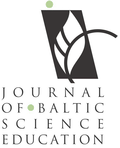RECONCEPTUALIZING AND FIELD TESTING THE SCIENTIFIC LITERACY FRAMEWORK BY EXPLORING THE ASPECT OF SCIENTIFIC LITERACY IN TURKISH SCIENCE CURRICULUM
| Title | RECONCEPTUALIZING AND FIELD TESTING THE SCIENTIFIC LITERACY FRAMEWORK BY EXPLORING THE ASPECT OF SCIENTIFIC LITERACY IN TURKISH SCIENCE CURRICULUM |
| Publication Type | Journal Article |
| Year of Publication | 2019 |
| Authors | Cansiz, M, Cansiz, N |
| Journal | Journal of Baltic Science Education |
| Volume | 18 |
| Issue | 5 |
| Start Page | 681-691 |
| Pagination | Continuous |
| Date Published | October/2019 |
| Type of Article | Original article |
| ISSN | 1648-3898 |
| Other Numbers | E-ISSN 2538-7138 |
| Keywords | affective domain, document analysis, Science Curriculum, science education, scientific literacy framework |
| Abstract | The aim of this research was twofold. The first aim was to revise the existing scientific literacy framework developed by Boujaoude in accordance with the current literature about scientific literacy. The second aim was to explore how the aspects of scientific literacy were reflected in the Turkish science curriculum using the revised framework. The impact of science and technology on environment resulted in the need for both scientifically and environmentally literate individuals and therefore, any framework examining scientific literacy should include the interaction between science, technology, society, and environment as an aspect. Moreover, a new aspect was suggested for the framework, the affective side of science, considering the affective outcomes of science education. Finally, the science curriculum from grades 3 to 8 was analyzed using the revised framework. Results showed that the revisions on the framework resulted in a more rigorous framework which evaluates scientific literacy more precisely. Moreover, the results about the analysis of science curriculum indicated that the knowledge of science and the investigative nature of science were reflected in the objectives of the curriculum more than other aspects. The results and implications were discussed. |
| URL | http://oaji.net/articles/2019/987-1571126948.pdf |
| DOI | 10.33225/jbse/19.18.681 |
| Refereed Designation | Refereed |
| Full Text |
